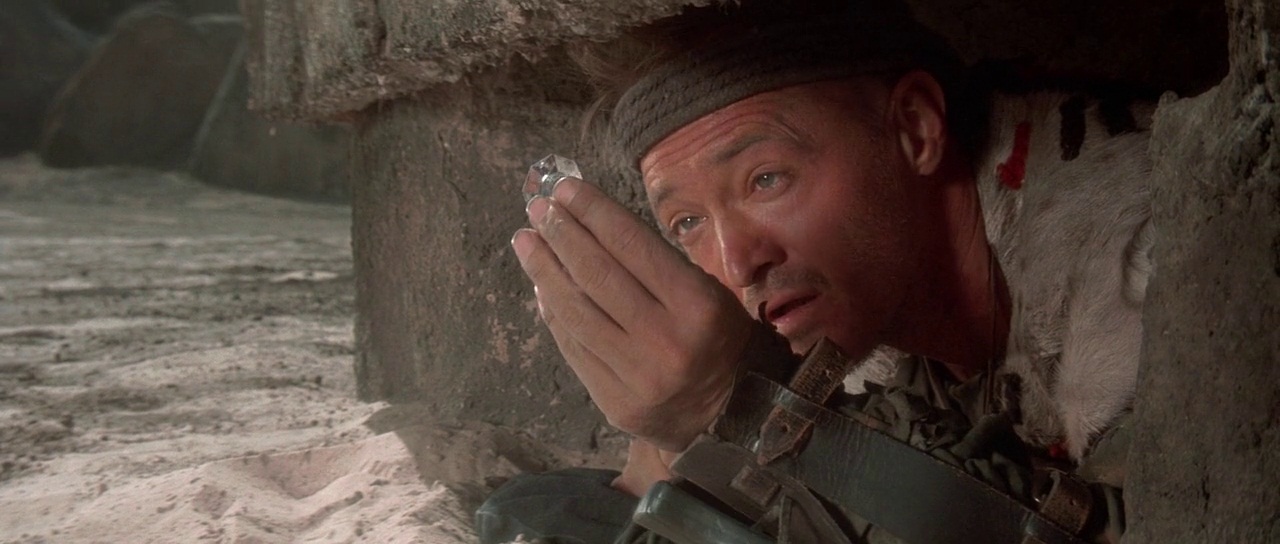
In last night’s game the thief endured a nasty trap and discovered a magic item on the corpse of a previous victim. Unfortunately it was an item he couldn’t use, so when the party got back to town he tried to hock it. The party was up in arms – it was actually the first magic item they had found and several party members really wanted it. The thief insisted that he had risked his life for it so he should get to do with it as he pleased.
Sound familiar? I think we’ve all played with the thief character who is always looking out for number one. Whether it’s skimming a little off the top, trying to pocket the best bit of treasure before the rest of the party notices, or even pick-pocketing fellow party members, this can lead to some real inter-party strife. The player will often defend themselves with “I’m just playing my character! I’m a thief!” But it still leads to resentment, and can even end with that player finding themselves uninvited to future games. How do you deal with it? I have some thoughts.
The problem is one of separation of player and character. As DM, I try to never involve myself in discussions of how to distribute party loot. It feels like such an “in character” thing that I feel I shouldn’t get involved. However, the above problem player often fails to make it clear when they’re just trying to portray a sneaky, self-interested thief vs. trying to make their character better, richer, or more powerful at every other player’s expense. I think there are a couple methods you can employ to play nice with the group, and let everyone have a little fun while still being true to your character.
Make In-Character Vs. Out-Of-Character Super Clear
When you say “I try to hock the sword” and the party makes a fuss, don’t reply with “Hey, I risked my neck for this thing, I deserve the pay-off.” Say something like “Sneaky Pete gives the rest of the party the stink-eye and says ‘Oi, I risked my neck for this thing, I should get sumfink fer it.'” It’s a subtle difference, but it clues the other players in that you’re engaging both as the portrayer of Sneaky Pete, but also as co-narrator of the story.
More so, follow this up with calling out responders who are unclear if their response is in-character or out-of-character. For example, if someone says “That’s not fair, Pete can’t even wield a polearm!” ask them directly “are you saying that in-character?” that way you can respond appropriately. If it’s a player response, you can reply with “you’re totally right, someone in the party who can use the polearm should have it, but Sneaky Pete is an asshole who is always out for what he can get.” Or if it’s in character, you can then together have a fun in-character conversation grounded in the fact that you are two people who don’t have a conflict pretending to be people that do.
Help Pursue The Group Goals
It should be pretty obvious that the group would benefit by having a magic polearm. So when you find you have to balance that against portraying the rat-bastardry of Sneaky Pete, try to find a way to do it that still engages the group’s goals. For example, maybe have Sneaky Pete approach the fighter in the group: “Hello my friend, look at this shiny polearm I found. Because we’re pals I can cut you in on a real deal – just 1,000 gold and it’s all yours!”
Share A Laugh Over Your Character’s Set-Backs
Watching a greedy bastard get shut down or make a fool of himself is entertaining. Make it clear to the group that you too find this entertaining too, even though it’s your character. For example, say the DM asks for a stealth roll as you try to separate from the group to go sell the polearm, and you roll a 5. The DM says several members of the group notice you trying to slink off. Grab the narrative reigns:
Sneaky Pete holds the polearm behind his back, the heavy axe blade obviously swaying around above his head. He looks at the party members all staring at him and says, “What polearm? Oh, um, right, this polearm! I was just, er… going to see if I could find a wizard to identify it. Why don’t you join me?” If the fighter comes along with him he then grumbles “stupid eagle-eyed so-and-so…” then turns to look at the fighter who can clearly hear him and gives him a bit shit-eating grin.
If It Gets Heated, Step Back
If things should go badly, step back completely and have a quick out-of-character chat with your fellow players. Say some of the things I’ve said here and make your intentions as clear as possible. For example, if everyone is looking really upset at you trying to get more than your share for the magic polearm, try this:
Hey guys, real quick out-of-character — I realize Sneaky Pete is a total bastard and I like playing that up for laughs, but I don’t mean to piss you all off for real. I’m totally cool with it if you want to play out dealing with him, but if you’d rather just say that you yell at him and threaten him until he coughs up the polearm and move on, I’m fine with that too.
Well, those are my thoughts on the situation off the cuff. This coming Sunday Dan and I will be having a related discussion on Wandering DMs about the separation between player and character, and how much or how little of each concern we like in our games. Watch us live at 1 PM Eastern and toss your thoughts into the chat, we’d love to hear from you!



Here’s what I think is a provocative counter-take on the issue: An argument that for simplicity, we should intentionally *collapse* the distinction between in- and out-of-character, partly so as to avoid the conflict between character and party goals in the first place. And also arguments about player vs. character knowledge and communications. Uses a metaphor of the “murky mirror” in which any player actions at the table are roughly reflected by the character in-world. (Apologies for some edgelord-isms.)
https://theangrygm.com/through-a-glass-darkly-ic-ooc-and-the-myth-of-playercharacter-seperation/
That post makes a lot of really great points. It’s too bad it’s written in such an abrasive tone. I don’t mind the swearing, but the general tone of “I’m brilliant, the rest of you are idiots” is quite annoying and difficult to force myself to read. Oh, I see, that’s the edgelord-ism you were referring to. OK, onwards…
The interesting thing is that while he’s arguing for less defined lines between character and player, by discussing it with his players ahead of time he is in fact forcing them to contemplate that duality and thereby re-enforcing its very existence. I think all too many players don’t even contemplate the separation, or fall entirely on one side of the fence or the other.
I like the “murky mirror” idea, well enough to even give it a try, but I suspect it would only really work in D&D. I don’t think it would work in games that have more character interaction play (I’m thinking stuff like say Call of Cthulhu). These are inherently different than board and video games — we acknlowedge that the characters do have unique points of view separate from their players and there is a heavy expectation that the players will do a fair amount of acting. Never-the-less, I’ve seen players take actions that are clearly destructive to the enjoyment of the rest of the table, all in the name of “I’m just playing my character.”
Consider this response to my blog post that appeared over on Facebook:
To his credit, the poster then also suggested that having up-front player conversations to set expectations (just like the Angry GM suggests) is best to head off the conflict entirely. That said, I think the above conflict can come up just as easily in the murky mirror scenario. Are we supposed to side with the player that killed the thief, because the thief was being a jerk and stealing treasure from the party? Is the player whose character got killed supposed to accept that as reasonable and just make another character, never addressing that they got attacked by someone that they’re now supposed to sit down and play with? Murky mirror sounds to me like it’s just so much hand-waving around letting these two players shout at each other and one to storm off. And now maybe we don’t have enough players to play the game anymore.
Maybe murky mirror will prevent the thief from stealing from the party in the first place. Maybe. Or maybe that player is actually a greedy player and was just using “I’m just playing my character” as an excuse to hide behind. In which case, I think Angry GM’s attitude is “good riddance to that player.” Unfortunately I think too much of that leads you back to playing video games by yourself because you don’t have enough friends that want to play D&D with you anymore.
I’m glad you read that and found it sufficiently interesting to think about and reword it! I agree that the original delivery is unfortunately way more clogged up than it needed to be. I’m very attracted to the idea, although I think I can poke holes in it certain circumstances, esp. since I’ve kind of been on the lookout for those from when I read it. (E.g.: Player asking DM for clarification of situation. Player asking DM for rules adjudications, recall of rules in the edition at play at the table, XP needed for next level, etc. You can stretch the idea but it gets pulled really thin.)
I must admit as a player than when a PC thief starts doing skulduggery to the party, I get uncomfortable about it, and need to put in lots of work to make reasons why attacking or booting that character isn’t the best, most obvious choice in-game. I do that labor, but I can never really suspend my own disbelief that it makes sense in anything other than a broad comic-book way. I’m really happy when everyone in a party intuitively gets the “we’re a team” theme without needing to have a discussion about it (fearing that will make more resistance and resentment).
One of the unspoken assumptions about a RPG is that in any given adventure scenario, you as the player must come up with an in-game reason why your character accepts the opening premise, and furthermore, has an in-game reason why he works with the other characters.
This is important for PCs and other PCs; not as important for PCs and NPCs.
This can be hard for someone who comes in with a particular idea and doesn’t want to play off others. That’s why having an up-front conversation is important.
@ Delta:
Ha! I haven’t read that article before (I don’t follow Angry’s blog), but it echoes most of my own sentiments. I haven’t tried hardcore “murky mirror” in the past…I’m usually rather permissive with player banter not affecting in-game events, for example…but I may implement it in the future.
@ Paul:
Mmm…I see you have a more recent post specifically called “murky mirror.” I’ll post my thoughts about THIS post on that entry.
I’ve got a very immature player who hasn’t really improved in two years. I think he is learning disabled but it’s not obvious how. He is otherwise pleasant and nice to be around.
But he always wants the best loot for the least work among the party. He is a greedy player, rather than playing a greedy character.
I don’t know how to instruct him on how to be more equitable.
We will try the OOC vs IC method and see how it goes. If you remember, ask me how it went in a few weeks.
Unfortunately my post here definitely presumes a mature player who wants to work with the other players. Sometimes though “I’m just roleplaying my character” is actually just an excuse to cover greedy player behavior. That’s a tougher situation I think.
Possibly making the player aware of the distinction between greedy character and greedy player is a step in the right direction, but I somehow doubt it will be the silver bullet. Definitely let me know how it turns out. Maybe this is worth a follow up post for DMs on how to deal with greedy players.
Scott, that’s a really interesting case, thanks for sharing it! (Easy for me to say that I don’t have to deal with it.)